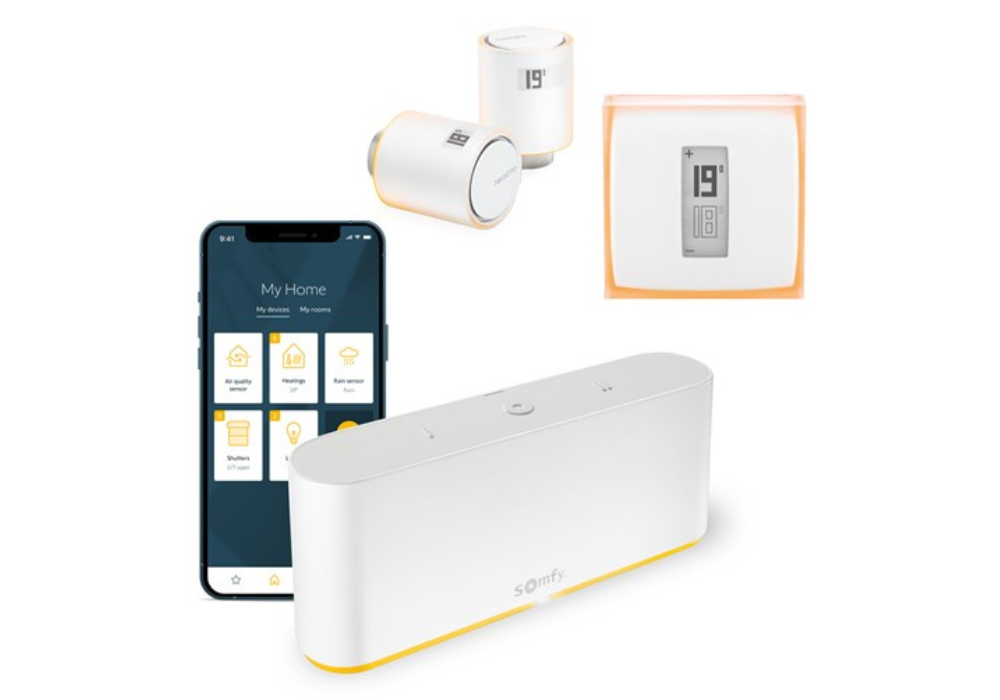
Netatmo utökar samarbete med Somfy

A GSM home alarm system is a wireless home security product. The security alarm itself, as well as its motion sensors and door and window opening sensors, link up to a mobile network. Basically, your GSM home security alarm will communicate with the wider GSM network using a SIM card.
A GSM home security alarm is reliable product for keeping your home secure.
If someone is trying to tamper with your home security system, they can’t simply shut off your home alarm systems by cutting your home’s power supply, or damaging its telephone lines.
Your GSM security alarm will still function just fine, as it will stay connected up to the GSM cellular network.
What’s more, GSM home security alarms are a wireless product. This means you’ll be able to install your GSM alarm quickly and easily. Wireless home security systems can be set up in any location around your home, as they’re not limited by complicated wiring that needs to go into the walls of your property.
So, you can choose the most strategic locations around your home for your new GSM alarm system. Most wireless home security systems are battery operated, including the security alarm control panel, any motion sensors, security cameras or security siren features. Battery operation means you can easily keep your security systems powered up and functional, to keep your home secure.
Plus, you might be able to install your wireless home security system using just DIY. No need for expensive installation costs! If you move from home to home fairly regularly (whether that’s renting or buying), you might want to seriously consider a wireless GSM home security system: wireless flexibility means you can take your home security systems with you, wherever home is.
GSM alarm systems communicate an alert to the authorities via a SIM card, just like the one in your mobile phone. So, like with a phone SIM card, you’ll need to pay subscription costs to keep your home security system linked up to the cellular network.
If you’re thinking about installing a GSM home security system, make sure you bear in mind this additional cost that will come on top of the general security set-up you put in: alarm control panel, motion detection sensors, security cameras, door and window opening sensors, etc.
Burglars have also been known to use cellular network jamming devices to disrupt a GSM home security alarm. As your GSM alarm operates via a mobile network, it won’t work if any potential intruders manage to jam the surrounding cellular network.
Make sure you don’t confuse a GSM security alarm with a PSTN (Public Switched Telephone Network) home security set-up. Unlike GSM alarms, PSTN home security systems use your landline connection in order to raise the alarm.
If you’re looking for more flexibility with the latest smart home security systems, why not take a look at the Netatmo range? You can integrate Smart Indoor Alarms, Smart Door and Window Opening Sensors, a Netatmo Smart Video Doorbell and Smart Indoor and Outdoor Cameras into a comprehensive home security system. Totally wireless and totally flexible!
So, what actually happens when your GSM product gets set off by a burglar – or any other unusual activity – in your home?
Your GSM product will emit a loud siren sound to alert people in the area to the fact that there’s been a break-in. This might force a burglar to flee before they’ve managed to steal anything. Plus, it will let you, your neighbours and any passing police (for example) know that there’s been an incident in your home.
Simply save your mobile number into your GSM security system and you’ll receive SMS alerts in real-time if there’s a security issue at your home. Then you can take action from wherever you are, while your GSM alarm siren is sounding to alert people nearby. You can also add your home security company’s number into the GSM system, if you’ve agreed to be part of a remote monitoring scheme.
You can stay up to date with what’s going on in and around your home, as the events happen.
Your GSM security products will keep you informed with SMS messages (via the cellular network), wherever you happen to be at the time. That way, you can keep up to date with what’s going on with your home security even while you’re away.
Or, your GSM alarm could send a message directly to the security company that you’ve got monitoring your home. That way, they can immediately take control of the situation and deter or deal with a burglar in your home.
Just like with other wireless home security systems, you’ll be able to activate or deactivate your GSM home security alarm remotely. Full control, from wherever you are, whenever you like.
If you’re somewhere that’s outside mobile network coverage, your GSM security alarm won’t be able to notify you that there’s a burglar in your home.
Also, GSM home alarms don’t have the same levels of flexibility as other smart security systems: you won’t be able to view the movements around your home in real time, for example, or control a smart video doorbell from wherever you are.